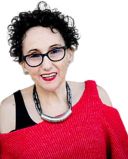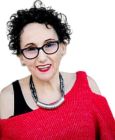Career
Weaknesses as Strengths and Strengths as Weaknesses
Sometimes, it's hard to see our qualities for what they truly are.
Posted September 21, 2014
During the course of my illness, there were many times I felt as though my weaknesses — both the ones I had identified and the ones that had not yet come to my consciousness — were getting the best of me. I’d get overwhelmed, frustrated and feel like giving up. Some of the weaknesses were even masquerading as strengths trying to defraud me.
I used to feel that my ability to lose large amounts of weight whenever I decided to do so was a strength. Other people couldn’t do that. It seemed so simple for me. I’d want to lose twenty pounds and I’d cut my calories to 300 a day and the weight would come off. Fast. But then I couldn’t stop. And I’d get sick, both physically and emotionally. For a very long time I had blinders on. I couldn’t see that single minded disregard for my health as a weakness.
Now at 53 I am dealing with many of the physical consequences of twenty-five plus years of anorexia. I have spinal stenosis, a herniated disc and arthritis in my back and I am in pain every day. I only have about half of my teeth left and dentists have recommended that all my upper teeth be extracted and I get an upper set of dentures. I have no time or place for regrets. I did what I did to myself and now I must deal with the after-effects and get on with my life.
But I don’t starve myself any longer. I am learning to live with the weight that lets me live at my optimal physical and emotional health even if it makes me flinch when I look in the mirror when I am naked, and I am learning to see that ability as a strength.
When I set goals and didn’t achieve them perfectly by a specific time in my life, I viewed that as a weakness. I wrote a book that was not published by the time I thought it should be so I put it “on the shelf.” Now I am ready to take it down and revise it and I am able to see why it was rejected and why it was better to wait. Because the experience and the insight I have gained in the time that has ensued will result in a stronger book. So I am trying not to punish myself for lacking the credit as a published book author by the age of 50 and hope that if and when the book is published it will be a much improved version.
One of my biggest perceived “failures” or weaknesses was or is my inability to be part of a couple or have a healthy and sustained emotionally and physically intimate relationship with a man. My psychiatrist, Dr. Adena (not her real name) and I have explored this and turned it upside down and around numerous times (and we probably aren’t finished) and so far have come to the realization that this circumstance in my life is most likely due to a combination of factors.
One is that I didn’t have a healthy first relationship with a man — my father — as a role model setting the stage for all other relationships with men. My formative relationship with him was destructive and resulted in tearing me down rather than building me up. Another issue was I didn’t have a good parental relationship to emulate. My parents never showed affection or even animosity towards each other, it was more a relationship of indifference than one of love or anger. Also my upbringing was a breeding ground of emotional invalidation, something that Marsha Linehan talks about as a factor in creating a later diagnosis of borderline personality disorder.
I’d be crying and instead of asking what I was crying about or validating that I must be feeling sad, my father would tell me to stop sniveling and say “Stop crying or I’ll really give you something to cry about.”
I also have inherited some schizoid traits. My father had (undiagnosed) schizoid personality disorder. He met all of the criteria. I’m not that extreme but I see some of him in me and it makes me shudder.
Dr. Adena and I discussed learning to accept myself the way I am and embracing the aspects of myself my more solitary lifestyle gives me the freedom to do —like concentrating on and enjoying my writing. This is a difficult concept because it goes outside the norms of society, never being married or in a relationship and being childfree. This is a fairly new phenomenon for me and I am still working on being okay with it.
I still get confused at times, but not as much. What masquerades as a strength initially may eventually turn out to be a weakness and what I perceive to be a weakness at first, I may be able to turn into a strength. It’s all a matter of perspective, but the change in perspective comes only with hard work in therapy and a willingness to turn the mind (a DBT skill).
This process is a work-in-progress and I don’t believe that there is one day where I will say that “I’m finished with this work. I’ve accepted that this is who I am and where I am in my life.” I believe that I will always be moving, refocusing, shifting my perspective and my point-of-view because where I am in life will constantly be changing.
Life only ends when we pass away, and this work hopefully, will end only at the same time.




